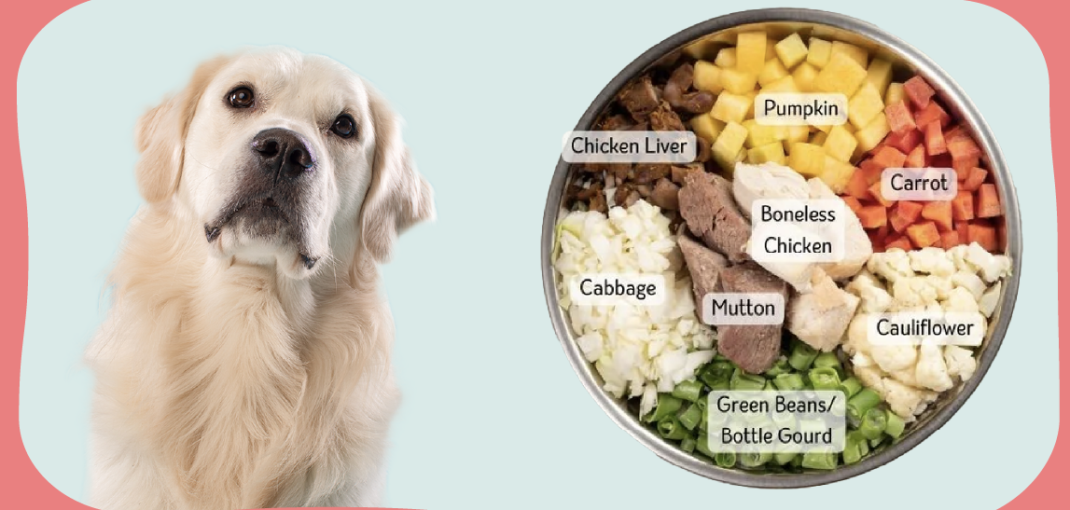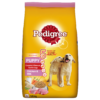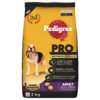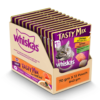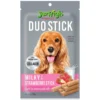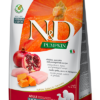When it comes to your dog’s health and happiness, few things matter as much as their diet. Just like humans, a dog’s nutritional needs can vary dramatically based on breed, age, and health conditions. Feeding your dog a well-balanced, breed-specific diet is crucial to ensure they live a long, healthy, and active life. In this guide, we’ll explore how to tailor your dog’s nutrition for their specific breed and life stage, highlight key ingredients, and discuss common mistakes to avoid.
Why Nutrition is Critical to a Dog’s Well-Being
Dogs rely on the nutrients in their food for energy, immune support, growth, and maintaining their overall health. A poor diet can lead to a host of health problems, from obesity and joint issues to digestive disorders and weakened immunity. By understanding the unique dietary needs of different breeds and life stages, you can help your dog thrive, minimizing the risk of preventable conditions and improving their quality of life.
Breed-Specific Nutritional Needs
While all dogs need a balance of proteins, fats, carbohydrates, vitamins, and minerals, their exact requirements can vary based on breed.
- Labrador Retrievers: Labradors are prone to obesity and joint issues, so their diet should be rich in lean protein and low in fat. Foods fortified with glucosamine and chondroitin can support joint health.
- German Shepherds: This breed often suffers from digestive sensitivities, making high-quality protein and easily digestible carbohydrates like rice or sweet potatoes essential.
- Bulldogs: Bulldogs can struggle with skin allergies and respiratory problems. Omega-3 fatty acids and limited-ingredient diets are beneficial for reducing inflammation and supporting their sensitive skin.
Each breed comes with its own unique set of dietary needs based on genetics and health predispositions, and tailoring their diet can help prevent or manage these conditions.
Age-Specific Diets
Just like their breed, your dog’s age will also dictate their nutritional requirements.
- Puppy Diets: Puppies need food high in protein and fat to support their rapid growth. DHA, a fatty acid, is important for brain development during this stage.
- Adult Diets: As your dog reaches adulthood, the focus should shift to maintaining their ideal weight and supporting their daily activity. Balanced levels of protein, healthy fats, and fiber are key.
- Senior Diets: Senior dogs benefit from diets lower in calories and fat, as their metabolism slows down. Ingredients that support joint health and digestion, like glucosamine, chondroitin, and fiber, become more important as they age.
Ingredient Recommendations
A breed and age-specific diet should also consider certain key ingredients:
- For Joint Issues: Large breeds like Great Danes and Golden Retrievers often suffer from joint problems. Including foods with glucosamine and omega-3 fatty acids can support joint mobility and reduce inflammation.
- For Digestive Health: Dogs with sensitive stomachs or breeds prone to digestive issues, like Greyhounds or Yorkies, should have diets with limited ingredients and high-quality, easily digestible proteins.
- For Obesity: Breeds like Beagles and Dachshunds can be prone to obesity. A diet with lower fat content, high fiber, and lean proteins helps manage their weight.
Avoid foods with artificial preservatives, fillers, and by-products, as they offer little nutritional value and can contribute to long-term health issues.
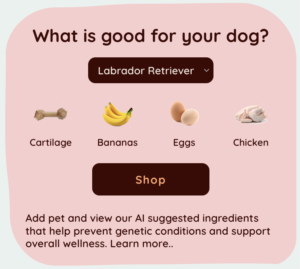
What breed you have?
Install and see recommended ingredients for your dog
DIY Meals vs. Commercial Food
Many dog owners wonder whether it’s better to prepare meals at home or rely on commercial dog food. Here are the pros and cons of both:
- DIY Meals: Preparing homemade meals allows for complete control over the ingredients, which is especially beneficial for dogs with allergies or specific health issues. However, it can be time-consuming and requires a lot of nutritional knowledge to ensure your dog gets all the essential vitamins and minerals.
- Commercial Food: High-quality commercial dog food is formulated to meet all of your dog’s nutritional needs and is convenient. The key is choosing a reputable brand with natural, whole ingredients and avoiding products that contain fillers and artificial additives.
Try Nuts Over Mutts – Egg Chicken Lite

Common Mistakes Dog Owners Make
Many dog owners, despite their best intentions, make mistakes when it comes to their dog’s diet. Here are some common pitfalls:
- Overfeeding: One of the most common mistakes is overfeeding, especially with treats. Obesity is a major issue in dogs and can lead to a range of health problems like diabetes and joint issues.
- Feeding Table Scraps: Human food isn’t always safe for dogs. Some foods, like chocolate, grapes, and onions, can be toxic to dogs, while others can cause digestive problems.
- Ignoring Breed-Specific Needs: Many owners don’t take their dog’s breed into account when selecting food. For instance, some large breeds need more calcium to support bone health, while small breeds may need food with smaller kibble for easier chewing.
Conclusion
Providing your dog with a breed-specific, age-appropriate diet can significantly enhance their quality of life and prevent many common health issues. Whether you choose homemade meals or high-quality commercial food, the key is understanding your dog’s unique nutritional needs. By focusing on the right ingredients and avoiding common dietary mistakes, you can ensure your dog enjoys a long, happy, and healthy life.

